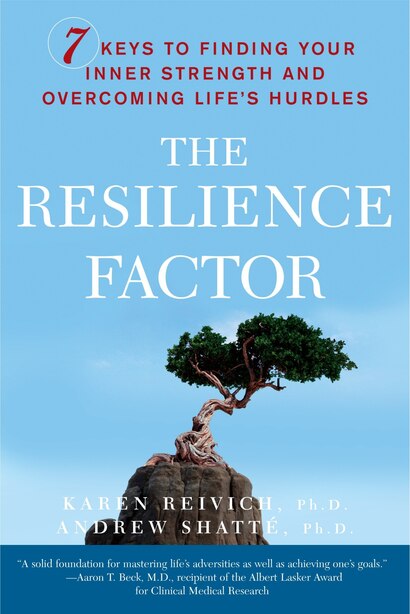
1 Line Summary
“The Resilience Factor” by Karen Reivich and Andrew Shatté presents a comprehensive framework of seven key strategies that collectively empower individuals to cultivate resilience and effectively navigate life’s challenges.
What Will You Learn
The book provides a comprehensive overview of resilience, the science behind it and seven proven techniques for enhancing resilience. The techniques are:
- Optimism
- Problem-solving
- Acceptance
- Flexibility
- Social support
- Meaning
- Spirituality
Best Quotations from the Book
- “Resilience is not about being invincible. It’s about bouncing back from setbacks.”
- “Optimism is not about ignoring the negative. It’s about seeing the positive even in the midst of the negative.”
- “Problem-solving is about taking action to change the things you can and accepting the things you can’t.”
- “Problem-solving is not about finding the perfect solution. It’s about finding a solution that works, even if it’s not perfect.”
- “Acceptance is not about giving up. It’s about acknowledging reality and moving forward.”
- “Flexibility is not about being wishy-washy. It’s about being adaptable and willing to change.”
- “Social support is not about relying on others. It’s about having a network of people who can offer you support and encouragement.”
- “Meaning is not about finding your purpose in life. It’s about creating your purpose in life.”
Key Takeaways
The authors introduce “concept of resilience” as a dynamic skill that empowers individuals to navigate life’s challenges and harness their inner strength to adapt and thrive in the face of adversity.
Active Optimism
Optimism is the foundation of resilience. It involves maintaining a positive outlook even in the face of challenges. By shifting the focus from problems to possibilities, individuals build a mental foundation that bolsters their ability to face difficulties with hope and determination.
Here is a way to implement optimism:
- Start by becoming aware of negative thought patterns and self-talk that arise when facing challenges. Recognize moments when doubt, fear, or negativity surfaces.
- Actively question the accuracy of these negative thoughts. Analyze evidence that supports or contradicts these assumptions. This process helps create a more balanced and realistic perspective.
- Embrace cognitive reframing by viewing obstacles as opportunities for growth. Train your mind to see adversity as a chance to learn, develop resilience, and acquire valuable insights.
- Engage in positive visualization. Imagine yourself overcoming challenges and achieving success. This practice reinforces a hopeful mindset, providing a mental blueprint for achieving goals.
- Control your environment by limiting exposure to negative influences. Surround yourself with positivity – supportive people, inspirational content, and uplifting environments.
Decisive Action
Decisive Action revolves around breaking down challenges into manageable steps, setting clear goals, and taking proactive measures to address issues. This strategy empowers individuals to confront problems with a sense of control and purpose, allowing them to make progress even in the face of adversity.
- Divide complex challenges into smaller, manageable tasks. This approach prevents feeling overwhelmed and provides a clear roadmap for addressing the issue.
- Define specific and achievable goals for each task. Clear objectives provide direction, focus, and a sense of purpose as you work toward resolution.
- Adopt a proactive stance by identifying actions that need to be taken. This mindset empowers you to take control of the situation rather than feeling powerless.
- Execute incremental steps towards your goals. Consistent progress instills a sense of accomplishment and builds momentum, boosting motivation.
- Evaluate your progress regularly and be willing to adjust your approach if needed. Flexibility in your strategy allows for refining your actions based on new insights.
Moral Compass
Moral Compass encourages individuals to align their choices with their core values. By making decisions that reflect their ethical beliefs, individuals build resilience through authenticity and a deep sense of purpose, even when faced with difficult choices.
- Reflect on your fundamental beliefs and values. Understand what principles guide your actions and decisions in various aspects of your life.
- Consistently align choices and behaviors with your core values. Prioritize decisions that resonate with your moral compass, ensuring authenticity and integrity.
- Evaluate choices based on your values. Consider the ethical implications of your decisions and opt for courses of action that reflect your commitment to honesty and respect.
- Rely on your moral compass as a guiding force during difficult situations. This foundation provides clarity and helps you navigate dilemmas while staying true to your principles.
- Upholding your values fosters a sense of purpose and strength. By consistently aligning with your moral compass, you build resilience that stems from the authenticity of your choices.
Relentless Tenacity
Relentless Tenacity emphasizes the importance of learning from setbacks, adapting strategies, and maintaining a growth mindset. Through perseverance and adaptability, individuals transform challenges into opportunities for personal growth and development.
- Embrace setbacks as learning opportunities. Analyze what went wrong and identify lessons that can be applied to future challenges.
- Cultivate adaptability by adjusting your strategies based on feedback and new information. Flexibility allows you to overcome obstacles with innovative approaches.
- Develop unwavering determination to persevere through difficulties. Persistence involves continuous effort despite obstacles or initial failures.
- View challenges as chances for growth. Adopt a growth mindset that frames setbacks as stepping stones toward improvement and personal development.
- Break down larger goals into smaller, achievable steps. Celebrate small wins along the way, which reinforces a sense of accomplishment and motivation.
Interpersonal Support
Interpersonal Support highlights the significance of building a strong support network and seeking assistance from others. Sharing experiences, offering empathy, and receiving guidance within relationships enhance emotional well-being and provide a safety net during challenging times.
- Invest time in cultivating relationships. Establishing a network of individuals who care about your well-being creates a foundation of emotional sustenance.
- Foster open communication by sharing your thoughts, feelings, and challenges with your support network. Honest dialogues create an environment where you can seek guidance and advice.
- Develop the ability to understand and empathize with others. This forms a basis for mutual emotional support and strengthens your connections.
- During difficulties, don’t hesitate to lean on your support network for emotional validation and encouragement. This shared experience can alleviate feelings of isolation.
- Be prepared to offer assistance to others within your network. Simultaneously, recognize that seeking help when needed is a sign of strength, not weakness.
- Collaborate with your support network to foster a culture of resilience. Sharing strategies, experiences, and encouragement mutually uplifts everyone’s ability to overcome challenges.
Reaching Out
Reaching Out encourages individuals to recognize the strength in seeking help. By acknowledging vulnerability and reaching out to their support network, individuals tap into collective wisdom and foster an environment of mutual assistance.
- Acknowledge that everyone faces challenges and that seeking assistance is a natural and courageous response to difficulties.
- Identify individuals within your support network who can offer guidance, understanding, and encouragement when you need it most.
- Clearly communicate struggles to those you trust. Opening up about your challenges creates an opportunity for others to provide valuable insights and empathy.
- Be open about your journey, including both successes and setbacks. Sharing your experiences fosters connection and reduces feelings of isolation.
- Allow others to help without feeling guilty or burdened. Recognize that accepting assistance is a reciprocal act that strengthens relationships.
- Recognize that seeking and offering help is a mutual process. Just as you benefit from support, your openness to assist others contributes to their resilience as well.
Calm Mindset
Calm Mindset centers on managing stress and emotions through mindfulness, relaxation techniques, and emotional regulation. By maintaining composure, individuals approach challenges with clarity, preventing overwhelming reactions and enhancing their ability to make thoughtful decisions.
- Engage in mindfulness techniques to anchor yourself in the present moment. Mindfulness reduces anxiety and promotes emotional regulation.
- Incorporate deep breathing techniques to activate the body’s relaxation response. Controlled breaths calm the nervous system and alleviate stress.
- Explore relaxation methods like progressive muscle relaxation or guided imagery. These practices release tension and promote a sense of calmness.
- Learn to identify and manage intense emotions. Practicing emotional regulation prevents overwhelming reactions during difficult situations.
- Establish routines that include stress-reduction activities such as meditation, yoga, or spending time in nature. Consistent practices foster a resilient, centered state of mind.
- Develop a habit of using positive affirmations during times of stress. Here’s how:
Identify Target Areas
Begin by identifying the specific areas of stress or challenges.
These could be related to work, relationships, personal goals, or any other aspect of life. Pinpoint the negative thoughts or beliefs that contribute to your stress in these areas.
Create Positive Affirmations
Develop positive affirmations that directly counter the negative thoughts or beliefs identified in the first step. Craft affirmations which are concise, specific and framed in the present tense.
For instance, if your negative thought is “I’m not capable of handling this situation,” your affirmation could be “I am capable and equipped to overcome challenges.”
Consistent Practice and Integration
Integrate these positive affirmations into your daily routine. Repeat them consistently, especially during moments of stress or self-doubt.
The key is repetition and belief. Over time, these affirmations rewire your thought patterns, replacing negativity with empowering beliefs.
If you want to learn how to build resilience and overcome life’s challenges, read “The Resilience Factor” today!
To know the insights of Habits, read “Atomic Habits“, and Click to Understand “The Insights of Self Awareness“


Pingback: “The Compound Effect” by Darren Hardy - Summarised Books
Pingback: “The Power of Now” by Eckhart Tolle -
Pingback: “The Slight Edge” by Jeff Olson -
Pingback: “The Art of Racing in the Rain” by Garth Stein -